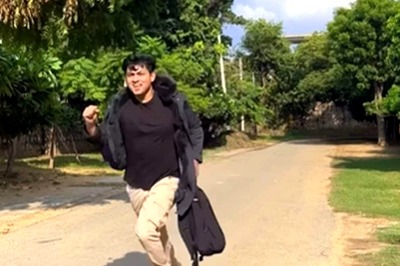
views
New Delhi: Raksha Bnadhan is that one festival that is celebrated across the country irrespective of religion, caste and community.
With its origins lying deep in history, Raksha Bandhan has a special place in our hearts. Taught right from childhood – that the silk thread sisters tied on to the brother's wrist was a bond of protection.
The rakhi is the sacred thread that is tied by the sister for the well being of the brother and the brother on the other hand blesses her and promises to protect and honour her forever. The festival of Raksha Bandhan is celebrated on the full moon day (Shravan Poornima) of the Shravan month of the Hindu lunisolar calendar.
Tracing the origins historically, it is believed that the Rani Karnavati of Chittor sent a rakhi to the Mughal Emperor Humayun asking for his help to protect her kingdom from Bahadur Shah. As the story goes, Humayun arrived too late to save her but he restored the lost kingdom to her son.
Another legend claims that Alexander’s wife Roxana had sent a rakhi to King Porus, asking him to spare her husband’s life. Porus had stopped himself when he was to deliver the death blow to Alexander on the battlefield when he saw the silk thread on this wrist.
Mythologically, the tradition of the rakhi is tied to the great epic Mahabharat. Draupadi had once torn a strip of silk off her sari and tied it around Krishna's wrist to staunch the bleeding from a battlefield wound. Krishna was touched by her action and declared her to be his sister, even though they were unrelated. He promised to protect her and repay her debt of concern and care. His promise took the shape of the never-ending sari that saved Draupadi in the court of the Kauravas after her husbands lost everything in the game.
Closer to our times, Rabindranath Tagore poppularised the rakhi tradition by tying rachis to his Muslim brothers. The action, especially during the troubled times of the Independence struggle, helped unite the disparaging religions together in a bond of brotherhood.
The main force of thought behind the Rakhi is a promise of unconditional care and love and protection from the brother. Over the years, Raksha Bandhan has grown out of the sibling relationship and has extended to brethrens of any sort.
The promise of unconditional good faith is what ties this silk thread together.



















Comments
0 comment